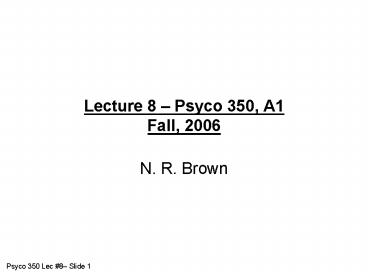Lecture 8 Psyco 350, A1 Fall, 2006 - PowerPoint PPT Presentation
1 / 21
Title: Lecture 8 Psyco 350, A1 Fall, 2006
1
Lecture 8 Psyco 350, A1Fall, 2006
- N. R. Brown
2
Outline
- Factors that influence Storage
- Rehearsal
- Organization
- Generation
- Levels of Processing
- Encoding Retrieval context effects
- Independent Contexts
- Interactive Contexts
- Forgetting
- decay
- retrieval failure
- interference
- inhabition
3
Two Types of Contexts
- Independent The information setting is
stored together w/ the trace of the stimulus
focal element, but does not fundamentally
change the trace. - Baddeley, p. 287
- external environmental, location
- internal physiological, emotional
- Interactive An interactive encoding occurs
when the context actually changes the way in
which the stimulus focal element is encoded.
-- Baddeley p. 287 - semantic strawberry JAM vs traffic JAM
4
Two Types of Contexts
- Independent
- external environmental, location
- internal physiological, emotional
- Interactive
- semantic strawberry JAM vs traffic JAM
- Encoding Specificity Principle
- The probability of recalling an item at test
depends on the similarity of its encoding at test
and its encoding at study - -- Anderson, p 206
5
State-Dependent Memory
- General Approach for studying context effects
- materials studied in StateX
- materials tested in StateX or StateY
- State-dependent memory effect observed when
memory is better when study test states match
than when they mismatch.
6
Context-Dependent MemoryGodden Baddeley, 1975
- Study X Test .
- land land
- underwater underwater
- Participants 16 divers
- Materials 40 words
- Results
- LL gtgt LU
- UU gtgt UL
7
Mood-Congruent Memory
- Eich Metcalfe (1989)
- Induce mood by using music.
- Read or generate during study
- Study-Test Design
- Study X Test .
- happy happy
- sad sad
8
Mood Congruence Eich Metcalf (1989)
- Results
- Generation Effect
- generate gtgt read
- Mood Congruence
- H/H gtgt H/S
- S/S gtgt S/H
- floor effect for read condition?
9
State-Dependent Memory Alcohol
- Goodwin et al (1969)
- Manipulation 10 oz of 80 proof vodka 24 hr
study-test delay - Standard 2 X 2 (I)ntoxicated/I, S(ober)/S, I/S,
S/I - Results (a) S/S lt SI (b) I/I lt I/S (c) S/I lt
I/I - Point (C) ?encoding better when sober.
10
State-Dependent Memory Marijuana
- Eich et al (1975)
- Manipulation m(arijuana) vs t(obacco) 4 hr
study-test delay. - Standard 2 X 2 m/m, t/t, m/t, t/m
- Results (a) t/t gt t/m (b) m/m gtm/t (c) t/m gt
m/m - Point (C) ?encoding better when straight.
11
State-dependent Memory
- State-dependent effect strong for recall than
recognition. - Reason recall requires more cues, and state
provides context cues - Sober_at_study gtgt Blasted_at_study, regardless of test
state. - Reason attention, comprehension, elaboration
processes more effective when sober.
12
Interactive Contexts
- General idea
- event traces encode meaning
- meaning emerges from the meanings of the focal
element and its semantic context. - retrieval cues that access encoded meaning will
be more effective than those that do not - Retrieval Cue
- A hint that can be used to evoke an item that has
been learnt but cannot be spontaneously recalled
13
Encoding Specificity w/ Interactive Contexts
- Thomson Tulving (1970)
- Aim demonstrate that recall depends on match
between encoded and cued meaning. - Materials 24 word pairs
- Design Input Contexts (2) X Output Cues (3)
- Input Contexts
- Strong hot COLD
- Weak wind COLD
- Output Cues strong, weak, no-cue
14
Results Thomson Craik (1970)
- Recall best when input output match
- Mismatch ?misdirects search.
15
LoP Encoding Specificity
- Fisher Craik (1977)
- Aim Demonstrate LoP and ES in same Exp.
- Design
- Encoding Task X Encoding Response X Retrieval Cue
- rhyme YES
rhyme - category NO
category - sentence
sentence
16
Fisher Craik (1977) Encoding Tasks
- Target Word train or house
- Encoding Tasks
- rhyme Does the word rhyme with brain?
- category Is it a form of transportation?
- sentence John took the ____ to Cleveland?
17
Fisher Craik (1977) Results
LoP
.22 .58 .51
- LoP Effect
- Category Sentence gtgt Rhyme
18
Fisher Craik (1977) Results
.22 .58 .51
- LoP Effect
- Category Sentence gtgt Rhyme
- Encoding Specificity
- encoding-retrieval cue matches gt mismatches
- example Transfer Appropriate Processing match
re processing - Why is cat/rhyme (43) gt rhyme/rhyme (40)?
19
Encoding Retrieval Main Points
- Memory Trace is combination of the stimulus and
the context. - Context broadly defined
- environmental, physiological, semantic,
procedural - Performance depends on
- encoding processes
- similarity between study context test context
20
Forgetting General Approaches
- Decay information in memory fades w/ time
disuse. - Memory trace spontaneously deteriorates over
time. - -- A.B.
- Retrieval failure retrieval cues do not access
sought after information. - Interference retrieval of sought-after-informati
on hindered by presence of other information. - memory either masks or obliterates other
information
21
Ebbinghaus(1885) The 1st Forgetting Function
- Task learned lists of 13 CVCs to criterion (2
perfect runs through list). - Manipulation Study-test delay
- Dependent Variable savings in relearning































